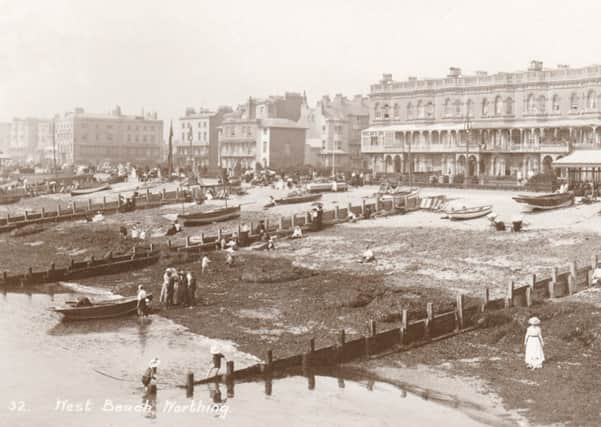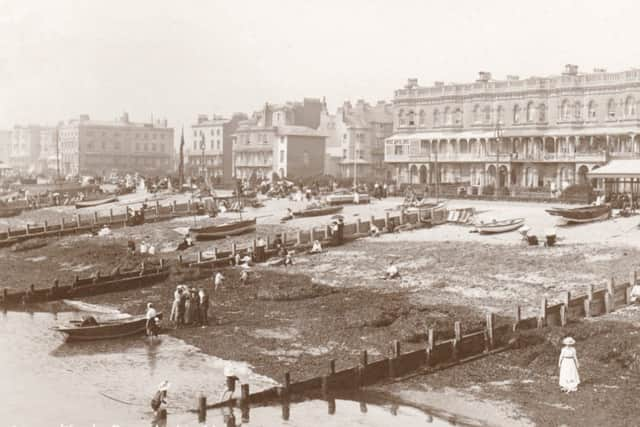Cambridge Terrace – and the Vagabond Singers of the Sands


A number of 19th-century terraces survive on Worthing seafront, but few have the charm of Cambridge Terrace, with its distinctive row of balconies on the first floor.
Also, it is omnipresent in hundreds of photographs and postcards of Worthing seafront, prominent and unmistakeable.
And it is a survivor.


Advertisement
Hide AdAdvertisement
Hide AdIf we compare Worthing seafront as it is today with how it looked in the year 1900, no building for 125 yards to the west of Cambridge Terrace survives from 114 years ago; and no building for more than 100 yards to its east.
Indeed, Cambridge Terrace is the seafront building above all others that would immediately allow a ghost-visitor from a dozen decades ago to recognise that he was in Worthing.
Cambridge Terrace makes its first appearance in the 1880 directory and, since directories were generally published at the start of the year, it is safe to assume that the terrace was completed in 1879. So it is 135 years old.
Although the upper floors of Cambridge Terrace are now divided into flats, originally the handsome four-storey houses in the terrace were each occupied by a single household from street-level to roof.
Advertisement
Hide AdAdvertisement
Hide AdThe fourth-storey, behind the balustrade, would have been where the servants slept.
Today, of course, the ground floors at Cambridge Terrace serve various commercial purposes, but many of the houses were in commercial use even in the early days, serving as boarding houses to cater for Worthing’s extensive holiday trade.
For much of the 19th century and most of the 20th, indeed, almost all the buildings on Worthing seafront were hotels or boarding houses.
In the summer of 1894, the complaint of an invalid who had come to convalesce at a boarding house situated in the middle of Cambridge Terrace provoked a controversy that required the intervention of the town council.
Advertisement
Hide AdAdvertisement
Hide AdThe September 5 edition of the Gazette carried a report under the headline “Singers on the Sea-Front”.
There is a lack of clarity as to dates, but the issue seems first to have been discussed by the council on August 13, with a further discussion taking place after the minutes were read at a subsequent meeting.
Mr J. E. Nash, the brother of the invalid in question, had complained about the seafront singers.
“My brother,” he wrote, “has been sent by his medical attendant to the sea-side, and is now lying seriously ill at 38, Marine Parade, and he complains most painfully of the abominable nuisance occasioned from morning to night by the itinerant street singers on the sea-front opposite his residence.”
Advertisement
Hide AdAdvertisement
Hide AdThe minutes recorded that the committee had passed the following resolutions: first, “that the Town Clerk inform Mr Nash that steps will be taken to remove the singers to other parts of the beach”; and, second, “that the inspector be instructed not to permit any singing on the beach or Parade, between the east side of the pier and the band stand”.
After the minutes were read, there were some exchanges about these “itinerant street singers”. (The Gazette’s report uses indirect speech, rendered here as direct speech.)
ALDERMAN GREEN (laughingly): I suggest the substitution of the word “country” for “beach” in the first resolution, which would thus read: “That the Town Clerk inform Mr Nash that steps will be taken to remove the singers to other parts of the country.” (Laughter.)
COUNCILLOR HINE: I am sorry to hear Alderman Green speak like that, as the singers are the only attraction the beach has had. People enjoy their performances a great deal more than they do those of the Socialists on Sundays, Salvationists, and so on.
Advertisement
Hide AdAdvertisement
Hide AdALDERMAN CORTIS: It was only a bit of pleasantry on Alderman Green’s part. We must cater for all sorts. (Hear, hear.)
COUNCILLOR FRASER: I agree with you for once. (Laughter.)
ALDERMAN LINFIELD: The singers have been found to be very ready to move in a case of illness. It would be very unwise to try to prevent them singing there, as a lot of people are glad to stand and listen to them, and all classes must be catered for. Councillor Haywood has suggested that the singers should use the Band Stand, but it might be better to have the Cabmen’s Shelter there for them. (Laughter.)
The singers in question were a group that called themselves the Olympian Quartet – and they attracted the interest of Oscar Wilde and Lord Alfred Douglas (“Bosie”), who were holidaying in Worthing that summer.
Perhaps the four singers, who would certainly all have been male, were young and good-looking.
Advertisement
Hide AdAdvertisement
Hide AdWilde christened the Olympian Quartet “the vagabond singers of the sands”, and he and Bosie were co-sponsors – together, rather oddly, with Worthing’s Mayor – of a concert featuring this controversial group of al fresco vocalists.
This event was held on September 7 at the Assembly Rooms in Bath Place (later the New Theatre Royal) – a building situated almost opposite the house where Alphonse Conway, the 16-year-old boy with whom Wilde had a relationship that summer, lived with his mother.
The Worthing Gazette of September 12 gave a short account of the concert.
“The four vocalists who have given performances on the sea-front during the season, and who style themselves the Olympian Quartet, had a farewell benefit concert at the Assembly Rooms on Friday evening. They had secured the patronage of the Mayor (Alderman R. Piper), Lord William [sic] Douglas, and Mr Oscar Wilde, and a large audience was present. Various performers assisted them, an ample and interesting programme being presented.”
Advertisement
Hide AdAdvertisement
Hide AdBosie had temporarily left Worthing by the time of the concert, so Oscar went with his elder son, nine-year-old Cyril.
In a letter he wrote Bosie the next day he said that there was applause as he and Cyril entered, adding that the audience thought Cyril was Bosie, the concert’s co-sponsor.
• Most of the material in this article comes from Antony Edmonds’s new book, ‘Oscar Wilde’s Scandalous Summer: The 1894 Worthing Holiday and the Aftermath’, out now in hardback, price £20.